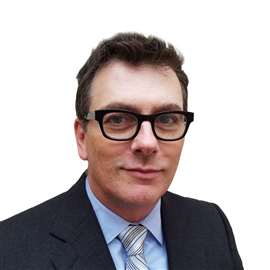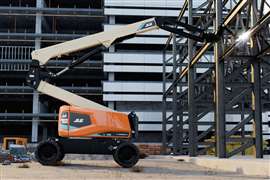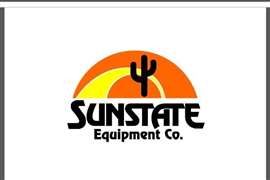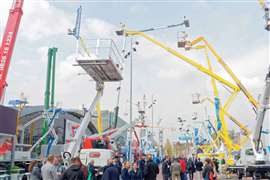Read this article in Français Deutsch Italiano Português Español
Eddie Precision gears up for global push
03 June 2025
China-base component supplier Eddie Precision is to set up an aerial platform division amid major plans for international expansion as it aims to become an alternative supplier to some of the world’s biggest machinery brands. Euan Youdale spoke to chairman and CEO Song Fei to find out more.
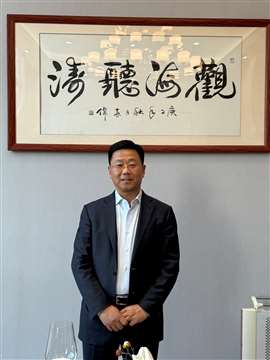 Song Fei, chairman and CEO of Eddie Precision. Photo: KHL
Song Fei, chairman and CEO of Eddie Precision. Photo: KHL
“We want to become an international company and expanding our global customer base is the aim.”
So says Song Fei, chairman and CEO of Eddie Precision, a major hydraulics parts supplier to manufacturers including XCMG, LiuGong and Zoomlion.
Established in 2003 as a specialist in hydraulic hammers, crushers, shears and grapples in the city of Yantai, eastern China, Eddie has grown ambitiously over the past two decades and now incorporates six wholly owned subsidiaries covering a comprehensive range of components from pumps, control valves and motors to industrial robots, machining cutters, battery packs and energy storage systems.
Now, like many Chinese manufacturers, the company is aiming its ambitious growth strategy at overseas markets, prompted by comparatively sluggish domestic growth since the pandemic and the added complications of global trade tariffs.
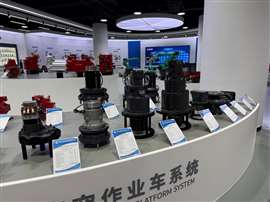 Parts for aerial platforms produced by Eddie. Photo: KHL
Parts for aerial platforms produced by Eddie. Photo: KHL
Last year Eddie partnered with Japanese multinational Kawasaki Heavy industries to create the Eddie KPM joint venture, supplying pumps, control valves and swing motors to customers.
Now the company is planning to open three new overseas factories as well as to ramp up its domestic production aimed at the export market.
And, with access platform components becoming an increasingly important part of its business, Eddie says it plans to set up its own independent division aimed specifically at the sector.
Song says that the company is hoping to more than triple its annual revenues over the next five years from RMB 3 billion (US$416.7 million) today to RMB 10 billion (US$1.4 billion) in 2030.
Eddie’s plan is to do this though expansion into countries outside of China as well as by driving up global exports, which currently represent just 13% of total revenue.
The company is set to start production at a new US$35 million factory in Thailand from July where a new eight-hectare facility will churn out hammers and other hydraulic parts.
And the company is planning to build a hydraulic parts base in India covering a further 100,000 square metres.
There are also imminent plans to expand in Europe. “Europe is a good place for hydraulic equipment, so it is very important to us.” Says Song.
While there has not yet been a decision as to where the company will set up production in Europe, it is actively researching possibilities and should come to a decision in the next three to six months. “We could potentially buy a company,” he says.
Expansion plans
Currently the percentage of company revenue derived from the US market is around 5% and the hope is to grow this to 15%.
According to Song, Eddie’s key advantage that will help it expand abroad - both for access and its other product groups – is the company’s massive production capabilities, including major investment in R&D. Some 15% of total staff at the company are employed in R&D, and the investment in the department is equivalent to 6% of total annual revenue.
Then there is the advantage of cost-effective production in China, complemented by an existing global dealer network that the company has established for its hammers that can be used as a springboard for its other divisions.
Apart from the new global facilities, the company’s domestic plant will also contribute to the increase in export revenue.
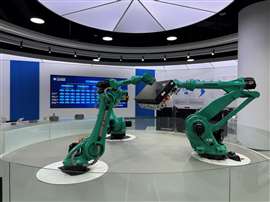 Industrial robots produced by Eddie. Photo: KHL
Industrial robots produced by Eddie. Photo: KHL
Eddie has already invested in 100,000 square metres of land for a new factory in its home town of Yantai to complement the 70 hectares it currently occupies. And there is a further 80,000 square metres in the nearby city Jinan, which is a major industrial town.
Meanwhile, the company is aiming to substantially expand its offering to the aerial platform sector, with an independent division purely focused in this area. Song says the new division will move into its own production base in a former hammer factory that has been specially converted by the end of this year.
“With everything that is happening at the company there was a risk that the access side of the business could have been pushed aside and forgotten, so it’s important we keep focused on it,” he says. “Making it independent will be good to expand the product type in the company and will help expand relationships with current customers.”
Indeed, Song says the company is in talks with major access related brands outside of China and is confident of making deals in the future.
Asked if Eddie would expand its access-related facilities in Europe, Song answered that it was a possibility and that it would depend on demand.
And beyond Asia and Europe, Song sees further potential for the company to look at other parts of the world. The obvious market, he says, is the US, but the company says it plans to wait and see the effects of US President Donald Trump’s trade policies.
“It depends on the market conditions,” he says. “It is a very difficult market out there and the American market is particularly tough.”
STAY CONNECTED



Receive the information you need when you need it through our world-leading magazines, newsletters and daily briefings.
CONNECT WITH THE TEAM


